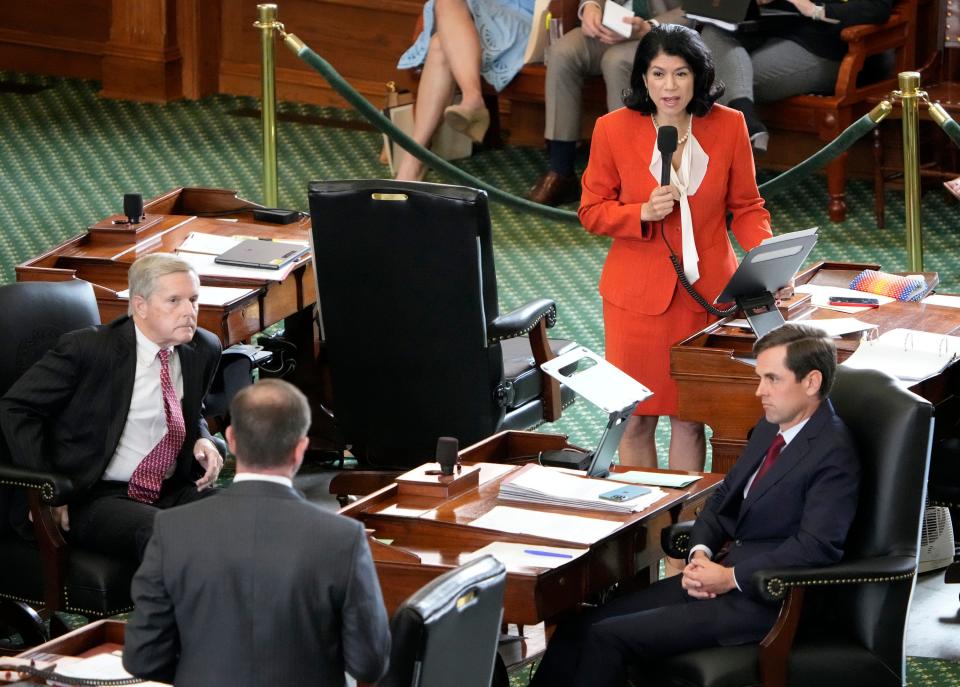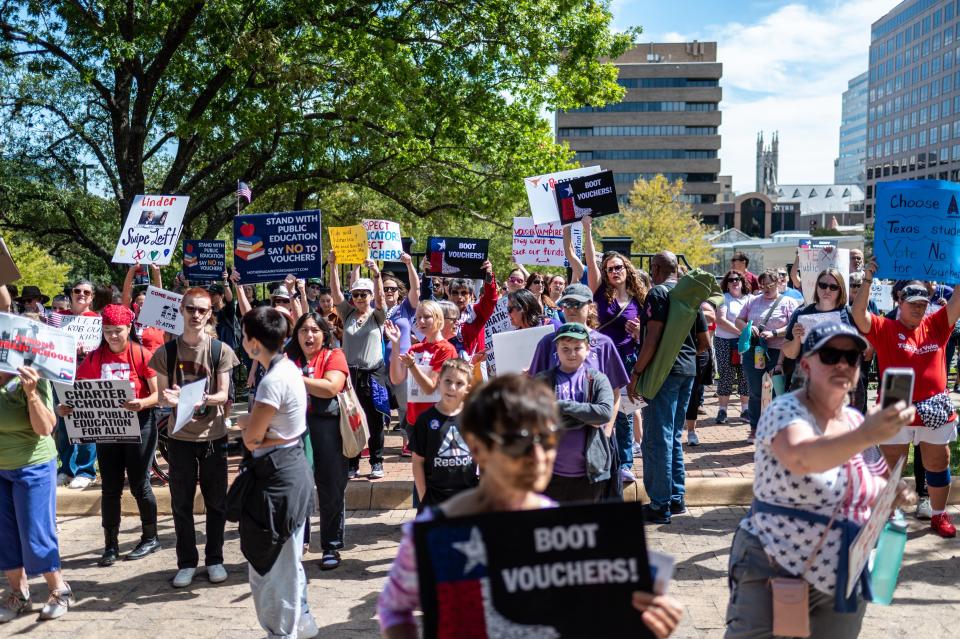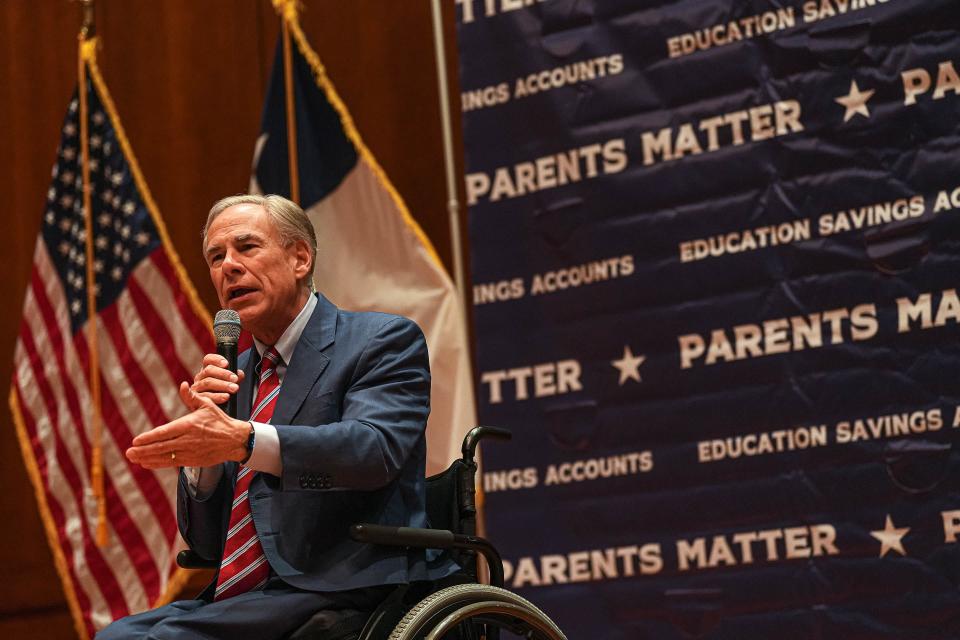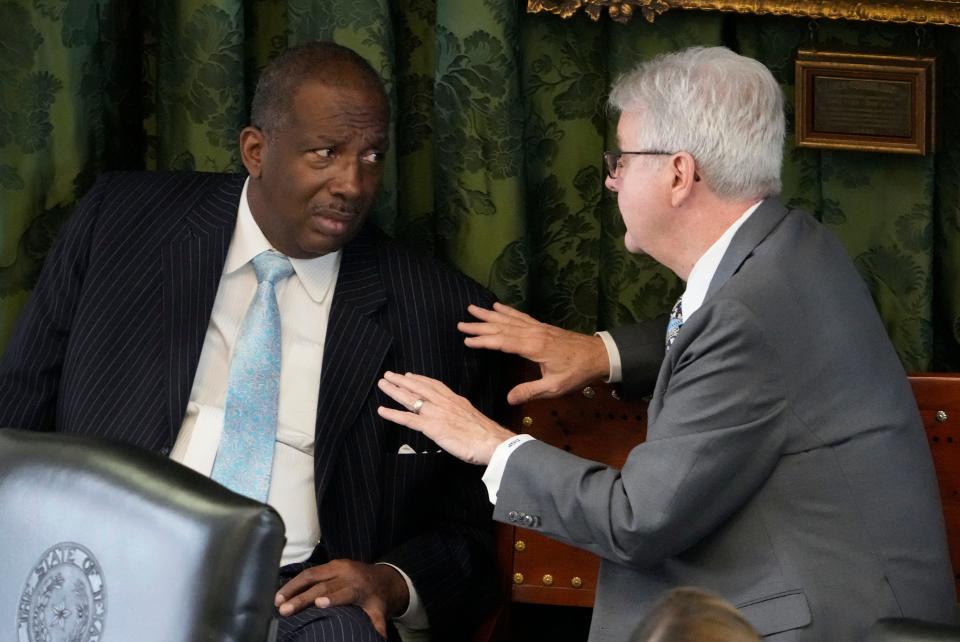Is school choice dead in the Texas Legislature? Lawmakers are at an impasse.
- Oops!Something went wrong.Please try again later.
The final days of the Legislature's third special session are drawing near, and lawmakers appear no closer to a deal for a sweeping school choice program.
The program, also known as vouchers or education savings accounts, would use public money to cover some or all of the cost of a student's private school tuition. It has been the priority issue for Gov. Greg Abbott in the last year.
Abbott has spent months touring the state to promote school choice, has threatened to campaign against lawmakers who vote against his plan and promised to call lawmakers back for another special session if they can't reach a deal.
Despite months of debate and political maneuvering, an agreement on school choice doesn’t appear close as Democrats and rural Republicans in the House have built an unwavering coalition against the proposal.
Political experts suspect that unless Abbott shows willingness to bend, the Legislature will remain in a stalemate over school choice.

“They’re just at impasse,” said Emily Sydnor, a Southwestern University associate professor of political science. “Unless someone has a change of policy position, which I don’t really see likely, I don’t see a future there.”
Most House Republicans who have opposed school choice don’t appear willing to accept a far-reaching voucher program and especially not without a significant infusion of state spending in public schools.
While the Texas Senate easily passed a sweeping school choice program, the House bipartisan coalition against such proposals have held up any similar legislation in the lower chamber.
“Part of what it comes down to is fundamentally different understandings of how you improve student experience,” Sydnor said. “Is it that you invest more in public education and teacher compensation? Or is it that you give students a broader choice of where to go to a school?”
In his House Bill 1, House Education Chairman Rep. Brad Buckley, R-Killeen, proposed a 180-page bill that would increase public school funding and phase in a school choice program over several years.
Buckley’s office has said the bill won’t be referred to committee until Abbott agrees to let lawmakers consider public school funding during the session. Abbott, however, has remained insistent that he wants to see a school choice program pass before he expands his session call to allow lawmakers to consider more money for public schools.

For some political experts, his unwillingness to bend at all is curious, said Pat Flavin, a Baylor University political science professor.
“Greg Abbott is usually a pretty shrewd politician in the sense that he knows where things stand,” Flavin said. “It sure seems here he's very adamant about pressuring rural Republican House members into supporting a much larger voucher bill, school choice bill than they'd like to.”
More: Some Texas GOP lawmakers say governor's primary threats won't sway them on school choice
The repeated losses for the governor aren’t necessarily a good look, said Cal Jillson, a Southern Methodist University political science professor.
A narrower school choice provision would be less of a loss for Abbott than multiple failures to pass anything, Jillson said.

“He seems to be fighting the same battle over and over and losing it to the same coalition of Democrats and rural Republicans,” Jillson said. “I find it really curious that he hasn't adjusted his offer.”
The continued inability to pass a voucher program through the Legislature is a loss for Abbott, but it would also be injurious to walk away from the session without significant increases to the school funding formula or teacher pay raises, he said.
Still, if lawmakers can’t come to an agreement on school choice by Nov. 7, the session's last day, it’s likely Abbott would make good on his promise to call lawmakers back for another 30-day session focused on school choice, Jillson said.
“I think Lucy is happy to put the football down one more time if Charlie Brown wants to run at it,” Jillson said referring to the "Peanuts" comic strip characters. “I don’t know why you would do it again unless you plan on adjusting your offer significantly enough.”
Whether lawmakers buckle is another matter.

Regular legislative sessions are only scheduled for 140-days every other year in Texas. But with the regular session, special sessions and the impeachment trial of Attorney General Ken Paxton, lawmakers this year have spent more time in session than out.
People are getting tired, Flavin said.
At the same time, the Senate and House have been butting heads for months over the impeachment trial, property taxes and a conservative political action committee that met with a known Nazi sympathizer, among other issues.
House Speaker Rep. Dade Phelan, R-Beaumont, and Senate leader Lt. Gov. Dan Patrick have exchanged virtual blows for months.
The infighting and name-calling aren't conducive to getting leaders in a room together to make a deal, Jillson said.
Whether the issue will have an impact on future elections is yet to be seen, Sydnor said. School choice likely won't matter in general elections when people are choosing between the two parties, but it could sway some Republican primary voters. But it's too early to tell.
"We are not that great at thinking back long-term," Sydnor said.
This article originally appeared on Austin American-Statesman: Texas Legislature: Lawmakers at impasse on education savings accounts

